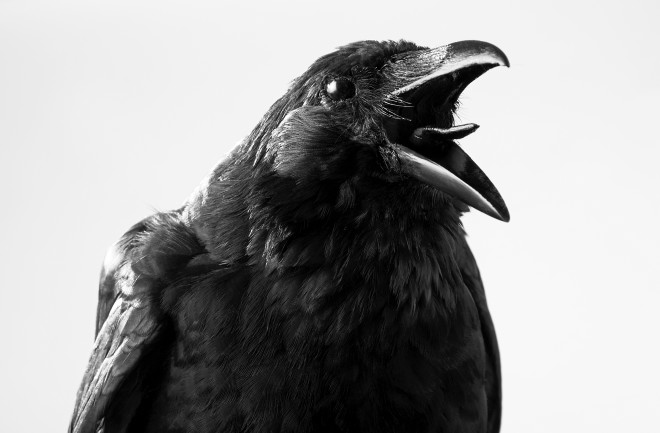What’s the News:
A few years ago scientists learned that American crows can recognize and remember human faces, particularly faces they associate with bad experiences. Now, new research published in the Proceedings of the Royal Society B shows that the birds can share that knowledge of dangerous humans with other crows.
How the Heck:
Five years ago, zoologist John Marzluff and his research team at the University of Washington trapped, banded, and released 7–15 American crows at five different sites near Seattle. Before trapping the birds, the researchers donned different rubber masks specific to each site (a caveman face, for example). While the birds were caged, nearby crows circled the site and sounded alarm calls.
The team then tested the crows’ reactions to the masks. Over the first two weeks, about 26 percent of the crows that the researchers encountered scolded — with a harsh, repeated kaw, accompanied by wing and tail flicking — the masked enemies. Groups of crows would sometimes mob the researchers as well, squawking and dive bombing them. When the researchers wore different, neutral masks, the crows normally did not react, suggesting that the tagged birds, as well as the birds that watched the tagging, remembered the “dangerous humans.”
Over time, more crows joined in on scolding the masked researchers. In a little more than a year, over 30 percent of encountered crows reacted, and by three years, about 66 percent did. That percentage has continued to increase. Interestingly, the crows did not need repeated reminders of their enemies. “They hadn’t seen me for a year with the mask on and when I walked out of the office they immediately scolded me,” Marzluff told ABC.
To test whether the birds were simply following the lead of crows that had been trapped or had seen the trapping, or if they had actually learned to recognize the dangerous faces themselves, the team looked at how fledgling crows reacted to the masked researchers. Turns out that if young crows, born after the trapping incidents, saw their parents scolding the researchers, they joined in. And even in cases where the adult birds had left the nests, the fledgling crows would still scold the dangerous humans.
What’s the Context:
Scientists have long known that crows are smart. Recently, researchers learned that New Caledonian crows can use tools to solve puzzles.
Crows are not the only species that mob their enemies: scientists have documented it in other birds, fish, and mammals.
Crows are not the only bird species that can remember human faces, either. In May, researchers in South Korea realized that magpies can recognize offending humans, no matter what they’re wearing.
The Future Holds:
The researchers are now investigating what happens neurologically when crows see a dangerous face, according to LiveScience.

